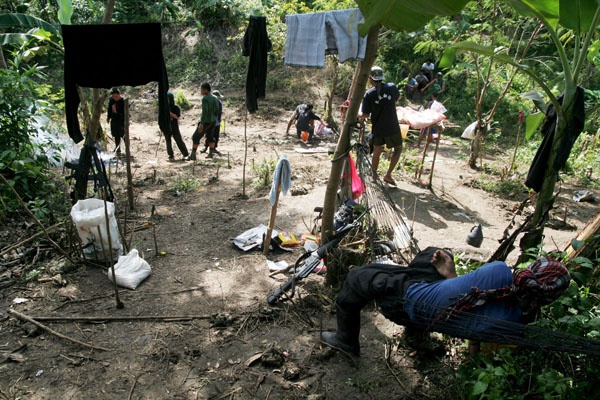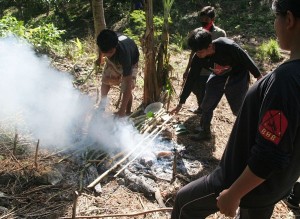
PAQUIBATO DISTRICT, Davao City (MindaNews/22 February) – It’s a sunny day and Ka Ruben, a New People’s Army guerrilla, turned the dial of his portable radio to scan for FM stations. He stopped turning the dial upon hearing “Carrie,” a hit song of Swedish band Europe, and started to sharpen his bolo beside his hammock underneath the young ipil-ipil trees.
After a few strokes and the bolo had become sharp enough, Ka Ruben laid down on his hammock and took a deep breath as he watched the houses of civilians from his post on top of a hill. With his assault rifle dangling on the branch of a tree, he took the opportunity to get a long rest until the afternoon.
He barely had 12 hours left to enjoy a complete rest before the ceasefire expired by 12 midnight of February 22.
The Communist Party of the Philippines (CPP) declared a weeklong ceasefire, from February 15 to 21, in deference to the start of peace talks between the government and the National Democratic Front (NDF).
Ka Ruben belongs to the NPA’s First Pulang Bagani Company under Leoncio Pitao, popularly known as Commander Parago.
On the other side of the hill, several mass supporters milled around the guerilla base sharing jokes and stories to the other NPA guerillas. It’s the last day of the truce, and aside from the mass supporters, some friends and relatives had come to visit the guerrillas.
Ka Ruben’s post overlooked a vast banana plantation and barren mountains, where they would normally operate and engage government troops every now and then.
“I’m sure after the ceasefire we cannot enjoy longer rest because we will be constantly moving from one place to other to evade enemy patrols,” he said.

Family visit
Ka Al, now in his late 40s, told MindaNews that the mass supporters or “masa” took the opportunity to consult them regarding their problems.
“Some would come here to talk about their personal problems within the family, some would come here to consult about their land problems, and some would come here to seek medical assistance. They come and go in our temporary base,” he said in the vernacular.
Some “masa,” Ka Al said, would spend a night with them in the hammocks and makeshift beds which are usually made of knotted branches.
He added that the ceasefire has given their family members a chance to visit them.
A few meters away from the hammock of Pitao, a female guerrilla prepared taro (gabi) leaves and stems for lunch while another NPA guerrilla grated coconut meat. They were preparing a lunch of taro cooked with coconut milk and spiced with chopped ginger and sliced green chili.
At 12 noon, everybody was called for lunch. But they took turns eating and manning their posts.
Pitao accidentally chewed chili, unaware that it was among the spices. One female guerilla also ran towards him and asked for water after she too chewed chili.
By 2pm, a loud wail of a pig echoed between the hills as the NPAs dragged the animal underneath a guava tree. The rebels bought the 107-kilo pig for P7,000 from one of their “masa” in the nearby village.
As Ka Ruben pulled his burnished bolo, two other NPAs held the pig for the kill while other guerillas set on fire dried wood and coconut leaves.
Instead of the usual practice of shaving the pig after pouring boiled water on it, the NPAs poured water and then scrubbed it with burning coconut leaves. They then shaved the skin using spoons, knives and bolos. It’s a like feast as some masa had come over to watch the guerrillas butcher the pig.
In the other outpost, some NPAs took time to read newspapers and magazines, which they could only enjoy if they are not on alert such as during a ceasefire.
Then a woman in her 60s came down from the hills after collecting the payment for her pig. A guerrilla approached her and handed about a kilo of meat as pabaon.
Still on alert
But even if the ceasefire was holding, the NPAs said some of them were keeping an eye on their perimeter. “It is a standard procedure, we are at war, you cannot be assured by the ceasefire.”
About an hour later, the butchered pig had been sliced into pieces and distributed to different squads. Near where they cut the meat, some NPAs set a fire to roast some parts of the pig.
For Ka Raya, the ceasefire allowed her to visit her 5-month-old baby, who was being taken care of by one of their “masa” in the nearby village.
“I miss my daughter but this is our life, time will come that she will understand why we are in this situation,” said the 21-year old guerrilla, an M-16 assault rifle dangling on her shoulder.
After the ceasefire, Ka Raya said, she didn’t know when she will see her baby again because she and her husband, also an NPA guerilla, had to move away.
Meanwhile, Ka Ruben and his comrades feasted on the roasted intestines and other organs while a huge portion of the meat had been preserved for the rest of the week.
“We just put salt and place them in our plastic containers. It will last for days as long as you don’t wash it with water,” he said.
As the day ended, Pitao said: “Look at the people, they also enjoy the ceasefire. This is the importance of the peace talks; nobody wants to go to war everyday. But sometimes the situation pushes the people to take up arms.” (Keith Bacongco/MindaNews)
